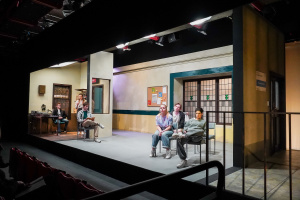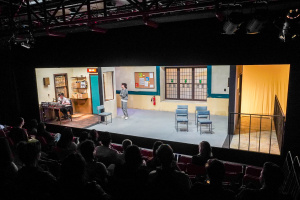Takin' Over The Asylum: Difference between revisions
| (28 intermediate revisions by the same user not shown) | |||
| Line 65: | Line 65: | ||
The sugar Glass smash at the end of act 1 was certainly a highlight of the show. The glass was broken during the show using an emptied, yet real, fire extinguisher. Due to the glass firing toward the audience at a close range, the movement had to be carefully thought through and choreographed. We couldn't get away with just hitting it once as the actor needed to get his arm through to unlock the door from the inside. | The sugar Glass smash at the end of act 1 was certainly a highlight of the show. The glass was broken during the show using an emptied, yet real, fire extinguisher. Due to the glass firing toward the audience at a close range, the movement had to be carefully thought through and choreographed. We couldn't get away with just hitting it once as the actor needed to get his arm through to unlock the door from the inside. | ||
As the sugar glass is so fragile, we had to come up with a plan to somehow not let it break for the entirety of Act 1. The solution was to use a perspex window the same size and swap it out during a scene. To do this it took us to open the door as wide as it possibly could go to avoid sightlines when a character rushed in. I'd then pull out the perspex and extremely carefully lift the sugar glass out, on its edge, so it didn't smash. A lot of that glass was broken during transit. | |||
[[File:Scotty_Carrying_Sugar_Glass.jpg|200px|]][[File:SugarGlassSmash.jpg|200px|Actor smashing sugar glass window|]] | [[File:Scotty_Carrying_Sugar_Glass.jpg|200px|]][[File:SugarGlassSmash.jpg|200px|Actor smashing sugar glass window|]] | ||
| Line 80: | Line 82: | ||
During the initial white card - final design process, I was not convinced we could fly someone in the [[Chandler]] therefore we looked into potentially using a darker lighting state and using the silhouette of a mannequin. Due to the twin-wall being quite transparent, the mannequin was obviously fake and no longer a viable option. | During the initial white card - final design process, I was not convinced we could fly someone in the [[Chandler]] therefore we looked into potentially using a darker lighting state and using the silhouette of a mannequin. Due to the twin-wall being quite transparent, the mannequin was obviously fake and no longer a viable option. | ||
Due to the twin-wall being see-through we could not have a backstage crossover within the venue. This, however, did allow us to build a truss structure around the frame of the windows. | Due to the twin-wall being see-through we could not have a backstage crossover within the venue. This, however, did allow us to build a truss structure around the frame of the windows. One struggle was getting a truss that height into position. It only fit into the Chandler roof gap, leaving nowhere to hoist a pulley above it. In the future, the best solution is to wrap two lines around the catwalk lx bar, and tie them on 1m down from the top of the truss. | ||
'''Kit''' | |||
The equipment used for the Performer Flying was a Petzl rig choked to the Steel deck using a strop. The black line then fed through a divert pulley over to the middle of the truss using a small climbing stitch bridle. This stopped the performer from being too far away from the window. | |||
'''Performer''' | |||
To ensure the performer was safe we had him try on the harness in the rehearsal room before a 1-hour induction in the set with staff present. We agreed upon hand signals for him to let me know he was ready. To hide him climbing the truss he climbed the side facing the back wall in a blackout cue during the first scene change. The music of the scene change also helped aid the climbing. To let the performer know he was going to start to descend as we couldn't communicate once he was at height, we rigged a Cue Light high enough for him to see and therefore wouldn't get a fright. | |||
[[File:Scotty_+_Dylan_PF_Behind_Set.jpg|300px|left]][[File:Asylum_Performer_Flying.jpg|300px|]] [[File:Asylum_PF_in_Colour.jpg|300px|]] [[File:Asylum_PF_Abseil.jpg|300px|]] | |||
[[File: | <pdf>Performer Flying RA TOTA.pdf</pdf> | ||
[[File:Performer Flying RA TOTA.pdf]] | |||
[[File:Performer_Flying_RA_TOTA.xlsx|300px|left]] | |||
=Lighting= | =Lighting= | ||
| Line 95: | Line 109: | ||
[[File:TOTAQL5.jpg|200px]] | [[File:TOTAQL5.jpg|200px]] | ||
[[File:TOTA_PRS_Form_1.pdf]] | [[File:TOTA_PRS_Form_1.pdf]] | ||
=Photos= | =Photos= | ||
https://flickr.com/photos/194465393@N05/albums/72177720299267791/with/52099862112/ | https://flickr.com/photos/194465393@N05/albums/72177720299267791/with/52099862112/ | ||
Latest revision as of 20:12, 6 October 2022
Overview
Stage Management
Technical Stage Department
The set was made up of exhibition-style flats that were able to be pin-hinged together. To achieve the desired 'Letter Box' look, the entire set sat upon 400mm steel deck and was framed with Hard Maskers. The steel deck became an advantage as we could bolt through it to support certain flats.


There were many technical elements to the show making it a busy show and stressful tech. Due to the Chandler not having a setting line like the Ath, I decided to create my own to ensure the steel deck and flats could be centred correctly and exactly where The Designer wanted them.
Sugar glass
The sugar Glass smash at the end of act 1 was certainly a highlight of the show. The glass was broken during the show using an emptied, yet real, fire extinguisher. Due to the glass firing toward the audience at a close range, the movement had to be carefully thought through and choreographed. We couldn't get away with just hitting it once as the actor needed to get his arm through to unlock the door from the inside.
As the sugar glass is so fragile, we had to come up with a plan to somehow not let it break for the entirety of Act 1. The solution was to use a perspex window the same size and swap it out during a scene. To do this it took us to open the door as wide as it possibly could go to avoid sightlines when a character rushed in. I'd then pull out the perspex and extremely carefully lift the sugar glass out, on its edge, so it didn't smash. A lot of that glass was broken during transit.
Window
Performer Flying
The desired effect of the performer flying was for the audience to see the character of Fergus as he 'abseils' down the side of the hospital building.
During the initial white card - final design process, I was not convinced we could fly someone in the Chandler therefore we looked into potentially using a darker lighting state and using the silhouette of a mannequin. Due to the twin-wall being quite transparent, the mannequin was obviously fake and no longer a viable option.
Due to the twin-wall being see-through we could not have a backstage crossover within the venue. This, however, did allow us to build a truss structure around the frame of the windows. One struggle was getting a truss that height into position. It only fit into the Chandler roof gap, leaving nowhere to hoist a pulley above it. In the future, the best solution is to wrap two lines around the catwalk lx bar, and tie them on 1m down from the top of the truss.
Kit
The equipment used for the Performer Flying was a Petzl rig choked to the Steel deck using a strop. The black line then fed through a divert pulley over to the middle of the truss using a small climbing stitch bridle. This stopped the performer from being too far away from the window.
Performer
To ensure the performer was safe we had him try on the harness in the rehearsal room before a 1-hour induction in the set with staff present. We agreed upon hand signals for him to let me know he was ready. To hide him climbing the truss he climbed the side facing the back wall in a blackout cue during the first scene change. The music of the scene change also helped aid the climbing. To let the performer know he was going to start to descend as we couldn't communicate once he was at height, we rigged a Cue Light high enough for him to see and therefore wouldn't get a fright.

File:Performer Flying RA TOTA.pdf File:Performer Flying RA TOTA.xlsx
Lighting
Sound
This show made use of the amazing set, by going for as much naturalism as possible. This meant the sound design had to head in the direction of realism and this started with speaker placement. This was achieved with two KV2 EX6s in the far L and R as a main PA, to be used exclusively for transitions states. Three KV2 ESD12s in a L,C,R position just slightly behind the main PA, these were for very specific spot effects and positional ambiences. On top of this we had two KV2 subs on the Catwalks for transition music.
Photos
https://flickr.com/photos/194465393@N05/albums/72177720299267791/with/52099862112/









